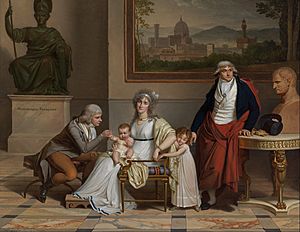André François Miot de Mélito facts for kids
Quick facts for kids
André François Miot de Mélito
|
|
|---|---|

Family of André-François Miot, painting by Louis Gauffier 1796
|
|
| Born | 9 February 1762 |
| Died | 1841 |
| Nationality | French |
| Occupation | statesman |
André François Miot de Mélito (1762–1841) was an important French statesman and scholar. He played a key role in French politics and diplomacy during a very busy time in history, including the French Revolution and the era of Napoleon Bonaparte.
Contents
Life of André François Miot
André François Miot was born in Versailles, France, on February 9, 1762. Before the French Revolution, he held a high position in the war office. When France became a republic, he rose to become the secretary-general for foreign affairs. He was able to keep his job and stay safe during the dangerous Reign of Terror because his skills were essential to his department.
Diplomatic Missions and Joseph Bonaparte
In 1795, Miot was sent as a French diplomat to Florence, and then to Rome. When he returned to Florence, he received orders to go to Corsica. At that time, Corsica was in a state of disorder after British forces had left.
In Corsica, Miot became friends with Joseph Bonaparte, who was Napoleon's older brother. Together, they helped bring peace and order to the island. After this success, Miot returned to Italy. However, in 1798, the French government, known as the French Directory, called him back. This was because he refused to encourage rebellions in Italy. He spent some time away from public life. But he was working as a diplomat in the Netherlands during the important event known as 18 Brumaire (November 9, 1799). This event led to Napoleon Bonaparte taking power in France.
Serving Under Napoleon's Rule
During the time of the French Consulate, when Napoleon was a leading figure, Miot became the secretary-general at the war ministry. He also joined the council of state, which advised the government. From 1801 to 1802, he was sent on a second mission to help bring peace to Corsica again.
In 1806, he joined Joseph Bonaparte in Naples, Italy, where Joseph was king. Miot served as the minister of the interior. Later, when Joseph became king of Spain, Miot followed him there and managed his household. However, Miot returned to France in 1813 during a difficult period for Napoleon's empire.
Later Life and Legacy
In 1814, Miot was given the title of comte de Mélito. During the period known as the Hundred Days in 1815, when Napoleon briefly returned to power, Miot served in the army. After the Battle of Waterloo, where Napoleon was finally defeated, Miot stopped being involved in politics. This was a sad time for him, as his son-in-law, General J. B. Jamin, was killed at Waterloo, and his own son was badly wounded and later died.
In 1825, Miot visited Joseph Bonaparte in America. Afterward, he spent several years in Germany with his daughter. Her second husband, General von Fleischmann, represented the king of Württemberg in Paris in 1831.
In 1835, Miot was accepted into the French Academy. This was a great honor, recognizing his excellent translations of ancient Greek texts. He translated the works of Herodotus (published in Paris, 1822) and Diodorus (published in Paris between 1834 and 1838). André François Miot de Mélito passed away in Paris on January 5, 1841.
Miot de Mélito kept a detailed diary from 1788 to 1815. This diary is very helpful for understanding the history of the Bonaparte family and Joseph's time as ruler in Spain. His son-in-law, General von Fleischmann, arranged for the diary to be published in France in 1858. It was later translated into English in 1881 and German in 1866-1867.
See Also
 In Spanish: André-François Miot de Mélito para niños
In Spanish: André-François Miot de Mélito para niños
 | Sharif Bey |
 | Hale Woodruff |
 | Richmond Barthé |
 | Purvis Young |

